Ten to 15 minutes.
That was all the time five Wharton professors had to pitch new business research ideas to an audience of students and YouTube viewers yesterday.
At the fourth annual Wharton Biztalks — an annual forum inspired by the TEDTalks series and organized by the Wharton Dean’s Undergraduate Advisory Board — faculty members gave presentations on their current research interests.
Like TEDTalks, the lectures were filmed, and will be available online on Wharton’s YouTube channel.
To illustrate the series’ popularity, Wharton junior and advisory board member Julie Cheng said that the videos of previous BizTalks have garnered nearly 15,000 views.
Professor of marketing Americus Reed began his talk with a presentation on the role of building brand identity — the ways in which consumers identify with a product.
Reed explained that companies should aim to build “identity loyalty” by aligning themselves with consumers’ values and making consumers into “advocates of the brand.”
He emphasized the importance of the brand’s community, drawing on examples ranging from Nike to iPhones.
Wharton junior Chadwick Prichard thought that Reed’s ideas were particularly pertinent, as they showed an application of theories learned in the classroom to a real market scenario.
“It’s very consistent with what I hear [in the classroom],” Prichard said, relating how one of his classes had investigated the marketing troubles of the Windows phone.
Following Reed, assistant professor of management Natalya Vinokurova presented on the failure of “analogous reasoning” — in other words, explaining concepts with analogies — and its role in the 2008 financial crisis.
At that time, Vinokurova said, banks had long been marketing mortgages to investors using language and investment structures better suited to the selling of bonds. Though this approach had originally been taken to make these mortgages more attractive to investors, the system ultimately backfired, she added.
Third up to speak was operations and information management professor Christian Terwiesch, who spoke about maximizing efficiency in medicine.
“Having interchanges like this allows us to showcase work that it’s very hard to showcase in the classroom,” he said. “Hopefully, students have a better appreciation of the things we do in the time we’re not with students.”
After Terwiesch, professor of marketing Barbara Kahn spoke of the power of variety and complexity in purchasing decisions.
She explained that most consumers want a wide range of choices, presented in a simple, easy-to-browse manner.
Meanwhile, Peter Cappelli, director of the Wharton Center for Human Resources, touched on a topic pertinent to many college students — the effects of various forms of financial aid on later life.
After all five lectures, with the speakers’ ideas still buzzing in the air, Cheng commented on the advisory’s board intentions for the BizTalks.
“Our goal is to get students, faculty and administrators to be part of a dialogue and to get exposure to these innovative research ideas that our faculty is pursuing,” she said.
While the spotlight shown most brightly on the professors, BizTalks are a student affair at heart.
“It’s really a student driven initiative,” she said. “It’s been really exciting watching it come together.”
Wharton and Engineering junior Ann Hewitt, who is also a member of the advisory board, is always pleased with what the lectures have to offer.
“Every year, it’s a totally different event. Totally new professors, very diverse areas of researc,” she said. “It’s always very interesting to see what they come up with and how the students react.”
Hewitt added that the BizTalks provide the perfect arena “for students to see what their professors are working on outside of the classroom.”



